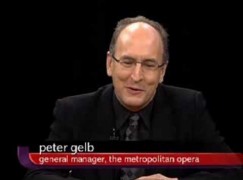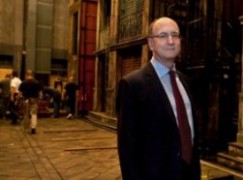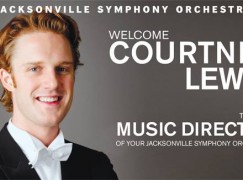The Hungarian virtuoso Ervin Schiffer, viola player of the Haydn Quartet and its forerunner, the Dekany Quartet, has died at the age of 82.
Born in Hungary, he moved to Holland and taught there at the leading conservatories.
Our condolences to his wife and quartet partner Kati Sebestyen (pictured).

The Polish government has cancelled all cultural exchanges with Russia for next year.
‘The Council of Ministers decided to call off the Polish Year in Russia and the Russian Year in Poland, planned for 2015,’ said government spokesperson Malgorzata Kidawa-Blonska. ‘This is the decision of the government, but both the foreign and culture ministers – Radoslaw Sikorski and Malgorzata Omilanowska respectively – unequivocally came to the conclusion that in [this] situation [after the MH167 disaster], it is impossible to follow through […] with the organisation of the Polish Year in Russia.’
The cultural cooperation agreement was signed only last December.

The letter sent by Peter Gelb to every member of Metropolitan Opera staff was ostensibly intended to give advance warning of a lockout that will ensue if their unions do not agree to Gelb’s cuts by the end of next week.
Its real purpose was to make ordinary people think about the personal cost of a lockout to themselves and their families, to drive a wedge of anxiety between individual workers and their union negotiators.
Fear is the oldest tactic in the HR book and Gelb is wielding it because he has nothing else up his sleeve.
The one person who has not considered the personal cost of a lockout is Peter Gelb. With the board rock-solid behind him, he is confident that a lockout will eventually deliver the savings he requires.
He is almost certainly wrong. The 1980 Met lockout ended after six weeks in a management capitulation. The Minnesota Orchestra lockout ended with the dismissal of its manager, Michael Henson, who had enjoyed full board support for more than a whole confrontational year. A lockout would be the worst thing that can possibly happen to Peter Gelb.
Only the unions can now save him from that disaster.

Norman Leyden fronted the Oregon Symphony’s pop concerts for 34 years – and made the arrangements that are still used today.

Lois Dick was a singer in Rodgers and Hammerstein musicals, until the lights went on.
In 1963, she co-founded Madison Opera and became its leading diva.
Obituary here.

Statement by Joe Hartnett,
Assistant Dept. Director Stagecraft for I.A.T.S.E.
On
Metropolitan Opera Management’s Threat to Lock out Performers and Backstage Employees
We want the show to go on. Our bargaining teams are very serious about hammering out an agreement with opera management. Several negotiating sessions have been scheduled over the next week. Management and their legal team have drawn red lines through our contracts, but seem to have very little understanding about what items cost or even how the opera functions backstage. This has slowed contract talks.
A lockout would be an opera tragedy, likely resulting in a lost season and a long-term loss of operagoers and subscribers for years to come. A lockout would not only leave theater seats empty in Lincoln Center — it would result in movie theaters going dark around the globe where the Met is simulcast.
Most of all, a lockout would be an indication of management’s failure to manage productions and manage negotiations. We all should be working together to save the Met, not locking out artists and shuttering this opera house.
Joe Hartnett, I.A.T.S.E’s Assistant Department Director of Stagecraft, is coordinating negotiations for the six IA locals at the Metropolitan Opera.

The manager has sent a letter his his employees, warning that he may shut the opera house down at the end of next week.
Salient sentence: ‘If we are not able to reach agreements by July 31 that would enable the Met to operate on an economically sound basis, please plan for the likelihood of a work stoppage beginning Aug. 1.’
The lockout would be the first in 34 years. This is a ma n who has learned nothing from Minnesota.

Union statement just in:
| FOR IMMEDIATE RELEASEWednesday, July 23, 2014 |
|
Metropolitan Opera General Manager Peter Gelb Threatens Lockout, Cancellation of the 2014/2015 Opera Season;Orchestra Musicians Denounce Gelb’s Long-Planned Lockout as a “Cynical strategy to cover up his failed management and
lack of artistic vision”
New York, NY–Wednesday, July 23, 2014–Local 802, American Federation of Musicians, and the Metropolitan Opera Orchestra musicians are dismayed that Peter Gelb has pursued a cynical strategy calculated to result in a lockout of his artists and craftspeople and imperil the upcoming Met Opera season. His callousness, combined with his attempt to cover up his failed management and lack of artistic vision that has resulted in declining audiences and plummeting ticket sales, jeopardizes the livelihoods of his employees and the many businesses in New York City’s cultural sector and the Lincoln Center area that depend on the Metropolitan Opera for their incomes.
For months, Gelb has purposely refused to provide essential financial information that would have allowed substantive, good-faith negotiations to proceed, instead making erroneous claims in the press in the run-up to his long-planned lockout.
If the Met in fact is facing financial difficulties it is due to Peter Gelb’s lavish overspending on productions that have been poorly received by critics and audiences. At the initial negotiating session scheduled for this Friday, July 25th, the musicians plan to propose ideas that would allow the Metropolitan Opera to realize over $20 Million in cost-savings and avoid draconian cuts to its artists. That Peter Gelb would announce the prospect of a lockout before the start of negotiations with the musicians, choristers, stagehands and other segments of the workforce is indicative of his disrespect for his audience, his artists and the City of New York.
The loss to the City’s economy as a result of a lockout will be in the hundreds of millions of dollars – first, the $327 million that the Met spends on salaries, sets, costumes and on many other vendors/services will be lost; on top of that, the losses to restaurants and hotels, especially those in the immediate vicinity of Lincoln Center, will be devastating given that the Met has 3,800 seats and its audience represents a high proportion of local restaurant and hotel patronage during the opera season.
Peter Gelb should engage in good-faith negotiations with the intent of salvaging the upcoming season rather than moving to arbitrarily shut down the iconic and beloved Metropolitan Opera.
|

For twenty-five years, in all forms of media, I have argued that London’s Royal Festival Hall is not fit for purpose as a classical venue. Over that period some £200 million of public money have been pumped into futile upgrades. The hall operators are presently asking for more.
Sometimes I felt like a voice in a wilderness as the entire classical establishment chorussed the glories of the hall.
So it’s nice to find a kindred spirit in Max Hole, Chairman and CEO of Universal Music Group International, who has just said on Classic FM: ‘Going off to the Royal Festival Hall and seeing a wonderful concert of music where the lighting was like the accident and emergency unit of a hospital.
‘There were no screens to show the musicians up close, the conductor had his back to you, he didn’t speak to you. I thought this was all wrong.’
So true. The RFH is a misery shed of browns and yellows, too much distance between stage and public and visually null.
Max is right. Get rid of it.
You can listen to his comments here.

It’s Paris, 1968, and they are lots of young women in the audience.
Whatever became of the girls in the orchestra stalls?

Click the word ‘Post’ if video does not pop up.
A richly deserved award for David Pountney, marking ten years as adventurous director of the Bregenz Festival.

Press release:
Welsh National Opera’s Chief Executive and Artistic Director, David Pountney, has been awarded the Austrian Cross of Honour for Science and Art, First Class. He was presented the award by the President of the Republic Heinz Fisher in a ceremony which took place in the opening of the Bregenz Festival.
The award honours Austrians and foreign leading figures who have “distinguished themselves and earned general acclaim through especially superior creative and commendable services in the areas of the sciences or the arts” and is conferred by the Federal President.
This year marks David Pountney’s last year as Artistic Director of the Bregenz Festival, a position he has held since 2004.
David Pountney says, “It is a great honour to be recognised by a State which has such an astoundingly rich cultural inheritance. I have worked on various Austrian stages from the Wiener Staatsoper to Linz whose new opera house opened with my production of Philip Glass’s new opera “Spüren der Verirrten” last year, but my main focus has been on the Bregenz Festival where I made my debut in 1989, and have enjoyed 10 marvellous years as Intendant since 2004.”
David Pountney has already been made a Commander of the British Empire and a Chevalier in the French Ordre des Arts et Lettres and was last year presented with the Cavalier’s Cross of the Order of Merit for his contribution to the promotion of Polish culture.
Lawrence Johnson has news of the closure of Boston’s Discovery Ensemble.
Founded in 2008 by the young British conductor Courtney Lewis and a musicologist, David St George, it aimed to draw high school and university students into playing in a classical orchestra.
Unfortunately, there weren’t enough donors around to sustain it. And Courtney’s gone on to greater things. Read Larry’s story here.












